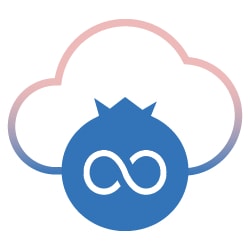 Podcasting by nature will cause download spikes that typically occur one to three days after the release of a new episode. These spikes also may occur when your podcast is featured on a website or Apple Podcasts.
Podcasting by nature will cause download spikes that typically occur one to three days after the release of a new episode. These spikes also may occur when your podcast is featured on a website or Apple Podcasts.
The primary reason it is a bad idea to host your media on the same server as your website is because of the media file size. Large media file downloads can cause your website to crawl following the release of new episodes.
Consider bandwidth
Websites have a finite amount of bandwidth available, which can lead to bottlenecks at any given time causing your web pages to load slowly, typically on release days of your podcast episodes. The bandwidth and resources needed to host a healthy podcast far exceed the demands of a normal web hosting provider. This is why companies such as Blubrry Podcasting specialize in using top-tier CDN networks to distribute podcast media without issue.
Your web server’s internet connection is a pipe that limits how much data can be transferred at any given point. The server’s connection, for the sake of example, could be 100Mbps. If you have a 60-minute mp3 file hosted on your server and 100 listeners try to download that podcast at the same time, your server will only be able to serve each media file at 1Mbps.
With today’s internet speeds, the user downloading the podcast will perceive if there is a problem because of the slow downloading. Furthermore, the other 99 downloads will choke your website from normal web traffic during the download spike. The result is a negative impact on your media delivery and your website.
As you choose your hosting plan with ample bandwidth, consider that Blubrry offers Private Podcast Hosting, Premium Podcasting, video-to-podcast conversion and the Podcast AI Assistant through its all-inclusive Thrive Bundle.
The best solution is to use a reputable podcast hosting service that utilizes a top-tier CDN (Content Delivery Network) service with podcasting best practices built-in.
Hosting a podcast on your website
 Considering the complex nature of podcast hosting on a website, a variety of factors come into play. The importance of effective engagement and smooth user experience cannot be underestimated for it has a direct impact on user retention and popularity of the podcast. Let’s review the issues again for trying to host a podcast on your website:
Considering the complex nature of podcast hosting on a website, a variety of factors come into play. The importance of effective engagement and smooth user experience cannot be underestimated for it has a direct impact on user retention and popularity of the podcast. Let’s review the issues again for trying to host a podcast on your website:- Hosting a podcast on your website can put an unnecessary strain on your web server’s resources. Podcasts, usually audio files of significant size, can eat up bandwidth quickly when multiple users stream or download them simultaneously. This can not only slow down the website for all users but also may result in additional costs for exceeding bandwidth limits.
- Hosting a podcast on your website does not automatically make it available on various podcast directories, such as Apple Podcasts, Spotify, Google Podcasts, and others. In the absence of this reach, the podcast may not attain the visibility it deserves, curtailing audience expansion.
- Podcast hosting generally requires detailed analytics to help understand listener behavior and preferences. Doing this alone can be challenging and time-consuming as it requires setting up a system to track and analyze usage data.
- For an engaging online presence, one must create an easy-to-navigate design, create engaging content, and strategically use multimedia. Needing to optimize all of this on your own website can be a daunting task, distracting from the primary goal of creating high-quality content.
What are the requirements for hosting podcast media files?
When picking a podcast media host, make sure they support the following features.
- HTTP/1.1 compliant – Required for most applications including Apple Podcasts
- Byte serving and byte-range request – Required by Apple Podcasts and many other portable devices and smartphones
- World-class content delivery network – Guarantees fast delivery of media to your audience
- Audio/video content types – Critical for serving media to portable devices such as iPhone and Android
- All valid HTTP methods supported – All types of HTTP requests (e.g. HEAD, GET, etc.) must be supported to guarantee media delivery to portable devices and software such as Tunes.
- Default HTTP protocol – FTP (ftp://) and other non-HTTP protocols limit what applications and devices can download your media. Media should be served using the default (http://) protocol.
Who should you host your podcast with?
![]() Blubrry’s Podcast Hosting uses its top-tier content delivery network (CDN) configured and optimized specifically for podcasting. CDNs are designed to handle spikes in downloads and delivery performance by serving podcast media closest to where the request occurred.
Blubrry’s Podcast Hosting uses its top-tier content delivery network (CDN) configured and optimized specifically for podcasting. CDNs are designed to handle spikes in downloads and delivery performance by serving podcast media closest to where the request occurred.
Blubrry’s CDN has over 50 dedicated data centers throughout the world. When podcasts are hosted by Blubrry, download spikes will not affect your website, your audience will be able to download your episodes as fast as their internet connection allows.
Blubrry’s Podcast Hosting also supports streaming for seamless playback on the web. Combined with web-based HTML5 players such as those packaged with Blubrry PowerPress or Blubrry’s own Blubrry Player, episodes can be played nearly instantly without any negative effect on your website.
Blubrry Podcasting and its parent company were founded by podcasters in 2005. Blubrry is the only podcast hosting service that includes free support including phone and video conferencing support. If you need to talk to a podcasting expert, Blubrry is ready to help you.
If you’re ready to call it quits and want to archive your podcast, we can help you with that as well. Next steps options will be offered upon receiving your cancelation request.
Where NOT to host your podcast media!
In general, you should NOT host your podcast media on the following:
- services that are not fully HTTP/1.1 compliant
- archive.org – Not completely HTTP/1.1 compatible
- Cloudflare – Known podcast feed and Media Issues
- Incapsula – Known podcast feed and Media Issues
- Your own website – Performance issues
- DropBox – URLs constantly change, violates TOS
- Google Cloud Drive – URLs do not work in podcast apps, violates TOS
- Microsoft OneDrive – URLs do not work in podcast apps, violate TOS
- Google Docs – URLs do not work in podcast apps
- Microsoft SharePoint – URLs do not work in podcast apps,
- Microsoft Office Online – URLs do not work in podcast apps
- Confluence – URLs do not work in podcast apps
- Box – URLs do not work in podcast apps
- Igloo – URLs do not work in podcast apps
Cloudflare and Incapsula are not compatible with podcasting
 Though Cloudflare and Incapsula may be excellent services for enhancing the performance of your website or dealing with a DDoS (denial of service) attack, they are not compatible with podcasting. These services are not intended to host large media files.
Though Cloudflare and Incapsula may be excellent services for enhancing the performance of your website or dealing with a DDoS (denial of service) attack, they are not compatible with podcasting. These services are not intended to host large media files.
Media files downloaded through CloudFlare or Incapsula typically prematurely fail during downloads, leading to applications such as Apple podcasts to only download and play the first portion of each episode.
Depending on the security mode they are in they can also block valid requests such as HTTP HEAD requests that are common for podcast applications. It is typical with these services for podcast feeds to be inaccessible by some subscribers and by podcast directories, most notably the Apple Podcasts directory.
Podcast feeds are also affected by these services. Depending on the security levels used in these services they can inadvertently block non-web browser user agents, such as Apple podcasts’ “iTMS” user agent. iTMS is the user agent Apple uses for updating the Apple podcast directory.
Hosting services that are not HTTP/1.1 complaint
Believe it or not, there are many services that are not completely HTTP/1.1 compliant. If you are technology savvy, you can use tools do determine if a web service is compliant by testing for byte serving and HEAD request support. if your podcast hosting company does not support the HTTP/1.1 protocol including HEAD and byte-range requests, find a new service immediately!
Can I use Dropbox or Google Drive to store my podcast?
Services such as DropBox, Cloud Drive, and Microsoft OneDrive have specific terms of service that do not allow you to use the service for content distribution. These services may throttle download bandwidth, not fully support the HTTP/1.1 protocol and/or terminate your service for violating their terms of service. Furthermore, the URLs that these services provide are not permanent, requiring you to update your podcast every few days with the latest valid URLs.
Document-sharing services do not work with podcasting
Services such as Google Docs, Microsoft SharePoint, Microsoft Office Online, Confluence, Box, and Igloo are designed for sharing documents and files within a web browser-based ecosystem. Such platforms are not designed to host podcast media files.




